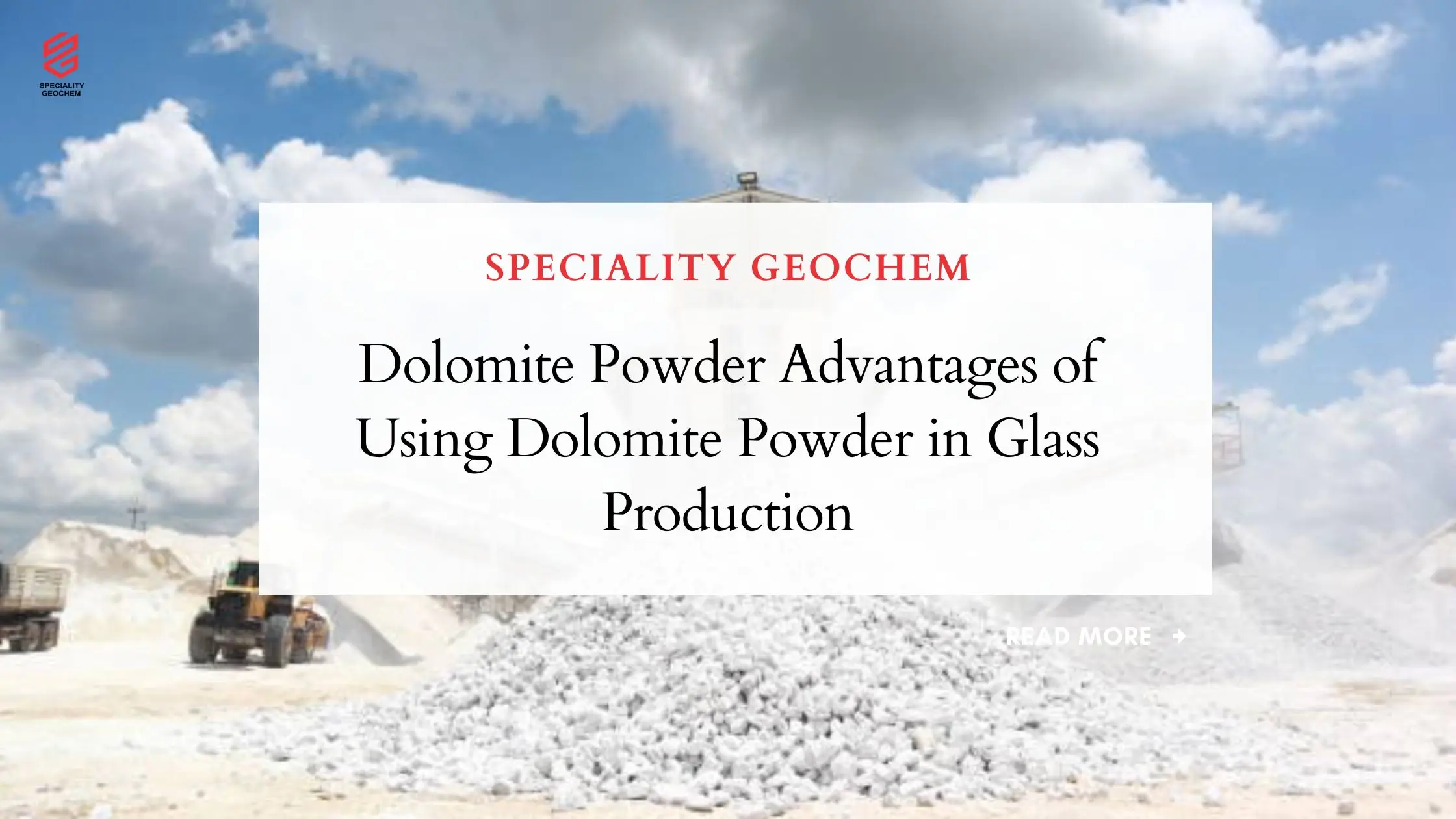Advantages of Using Dolomite Powder: Glass production is a delicate and precise process that requires the perfect balance of raw materials. Among these, dolomite powder plays a vital role in improving the quality, durability, and aesthetic appeal of glass products. Derived from the mineral dolomite, which is a combination of calcium magnesium carbonate, dolomite powder offers unique chemical and physical properties that make it an essential additive in the glass manufacturing industry. In this article, we explore the advantages of using dolomite powder in glass production and why it is highly valued by manufacturers worldwide.
What is Dolomite Powder?
Dolomite powder is produced by crushing and grinding the dolomite mineral into a fine powder. Its chemical composition typically includes calcium carbonate (CaCO₃) and magnesium carbonate (MgCO₃), making it a rich source of both calcium and magnesium. This composition provides a host of benefits in industrial applications, particularly in glass production.
The use of dolomite powder in glass is not new. It has been traditionally used to enhance the physical and chemical properties of the glass, contributing to its clarity, hardness, and thermal stability.
Why Dolomite Powder is Used in Glass Production
Glass is primarily composed of silica (SiO₂), which provides the basic structure. However, to achieve specific properties such as durability, resistance to thermal shock, and a smooth surface finish, manufacturers add other materials known as fluxes and stabilizers. Dolomite powder serves as both a flux and a stabilizer in the glass-making process.
Here are some of the main reasons for using dolomite powder in glass production:
- Improves Chemical Stability
Dolomite powder introduces calcium and magnesium into the glass matrix, which enhances chemical durability. This prevents the glass from reacting with acidic or basic substances, making it suitable for containers like bottles and jars that come in contact with food and beverages. - Reduces Melting Temperature
Incorporating dolomite powder into the raw material mixture lowers the melting point of silica. This not only saves energy during the glass melting process but also allows for more efficient and faster production. - Enhances Hardness and Strength
Magnesium from dolomite powder improves the structural integrity of glass. The addition of this mineral increases hardness, making the glass less prone to scratches and mechanical damage during handling and transportation. - Controls Thermal Expansion
Glass used in applications such as laboratory equipment or cookware must withstand sudden temperature changes. Dolomite powder helps control the coefficient of thermal expansion, reducing the risk of cracking under heat stress. - Improves Transparency and Appearance
High-quality dolomite powder, when properly processed, contributes to the clarity of glass. It prevents cloudiness and impurities, ensuring that the final product has a smooth and transparent finish, which is particularly important for decorative and container glass. - Cost-Effective Raw Material
Compared to some other additives, dolomite powder is relatively inexpensive. Its availability and abundance make it a cost-effective choice for large-scale glass production, reducing overall manufacturing costs without compromising quality.
Types of Glass That Use Dolomite Powder
Dolomite powder is versatile and can be used in various types of glass production:
- Container Glass: Used for bottles, jars, and other food and beverage containers due to its chemical resistance and durability.
- Flat Glass: Used in windows, mirrors, and architectural panels where clarity and smoothness are crucial.
- Specialty Glass: Laboratory glassware and heat-resistant glass products benefit from dolomite’s ability to improve thermal stability.
- Decorative Glass: Colored and decorative glass benefits from dolomite powder by improving uniformity and enhancing aesthetic appeal.
Processing and Quality Considerations
To maximize the benefits of dolomite powder in glass production, manufacturers pay attention to its purity, particle size, and moisture content. High-purity dolomite ensures minimal impurities in the glass, which is critical for maintaining transparency and chemical resistance. Finely ground dolomite powder ensures uniform mixing with other raw materials, contributing to consistent melting and glass quality.
Additionally, controlling the moisture content of dolomite powder is crucial. Excess moisture can lead to uneven melting, formation of bubbles, and defects in the glass. Therefore, proper drying and storage conditions are maintained before dolomite powder is added to the glass batch.
Environmental Benefits of Using Dolomite Powder
The use of dolomite powder in glass production also has environmental advantages. By reducing the melting temperature of silica, energy consumption is lowered, which in turn reduces carbon emissions. Moreover, dolomite is a natural mineral, and using it minimizes the need for synthetic chemical additives that might have a higher environmental impact.
Advantages of Using Dolomite Powder: Conclusion
In conclusion, as a leading Dolomite Powder manufacturer in India, Speciality Geochem ensures the supply of high-quality dolomite powder that meets the stringent requirements of modern glass production. Our dolomite powder enhances durability, transparency, and thermal stability, improving the overall quality of glass products while reducing production costs. By choosing Speciality Geochem, glass manufacturers benefit from a reliable, efficient, and environmentally responsible raw material solution. Whether for container glass, flat glass, or specialty applications, our dolomite powder remains a preferred choice for glass producers seeking consistency, superior performance, and sustainable manufacturing practices.

